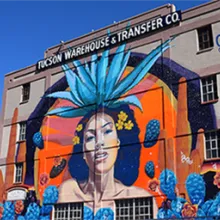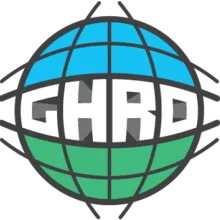In partnership with the Office of the Vice President for Research, Confluencenter initiated the Innovation Farm program. Through this program, the center provides critical seed money and staff support to interdisciplinary working groups including faculty representing the colleges of Fine Arts, Humanities and Social and Behavioral Sciences.
Innovation Farm grants support working groups that make lasting contributions to scholarly and artistic life at the UA. The goal is to leverage the Confluencenter's resources to provide faculty teams with enough support to achieve long-term viability, specifically by enabling pilot activities that form the basis of external grant proposals and donor outreach initiatives. "We are excited to see these two new working groups focused on border issues become part of Confluencenter's community," said Javier Duran, the center director.
Toward a Vision Of Community Wellness: Reclaiming Agency, Self-Care, And Connection To Place
The Innovation Farm-funded project will expand “workshops, classes, and hands-on experiences focused on addressing the root causes of health inequalities through the revitalization of food and herbal-based treatments, health maintenance, and spiritual rituals.” This project builds on an ongoing collaboration between Dunbar Coalition, Inc., El Rio Health Centers, the Coalition for African American Health and Wellbeing, and the UA Center for Regional Food Studies. Bringing together Jerome Dotson of the Africana Studies Program and Megan Carney of Anthropology, along with several community initiatives, Towards a Vision of Community Wellness will involve community education about gardening, herb identification and usage, and cooking. Innovation Farm support will go towards student staffing of the programming, invited speakers, and domestic travel in order to share local findings more broadly.
Indigenous Inequalities: Intersections of property, place, and rights in the United States and Australia
The project fosters scholarly exchange between researchers at the University of Arizona and at the University of Queensland, Australia, along with Indigenous community partners and applied practitioners from both countries. According to the proposal, “This research collaboration will explore a central question: how are intellectual and legal institutional frameworks for recognizing and protecting Indigenous land, knowledge, and property rights implicated in solutions to Indigenous inequality?” The project will facilitate two different workshops, one in Tucson and the other in Brisbane, Australia, along with webinars and a project wiki. The Innovation Farm award will facilitate student workers, honoraria, and web design and web conferencing for this ongoing project.
On the Edge: Expressions of Shared Heritages throughout Bounding Spaces (Spring 2017)

Mural in downtown Tucson
How do borders – of any kind at any time – create tensions that reflect cultural, ideological, linguistic and artistic expressions of division or cooperation among human beings? This project will create an ongoing, interdisciplinary faculty seminar to explore new approaches on colliding and reformulating cultural heritages, looking to respond how, over time, a mosaic of boundaries is imagined, created, enforced, or dissolved through history, geography, law, art, music, cinema, and language. By exploring diverse expressions of shared heritages through the lens of different boundaries – either political, legal, social, cultural, linguistic or economic – this project seeks to foster discussion and analysis on the complexity of change through forces and tensions, reflected in the transformations of people, spaces and identities.
Transfrontera: Movements, Community, and Identity in the Américas (Spring 2017)
This project seeks to bring together interdisciplinary scholars whose work critically examines the material and symbolic manifestations of borders. By centering the concept of borderlands, Transfrontera is making an intentional appeal to scholarship that attends to the violence and inequality that borders perpetuate, or what Gloria Anzaldúa called “una herida abierta” (an open wound), as well as the creativity, solidarities, and utopias that are possible when communities come together in the third space that emerges between worlds. Transfrontera invites scholars to engage the multiplicity of meanings found in the idea of borderlands movements, community, and identity in the Américas. By hosting networking events and works in progress and speaker series, Transfrontera will create a space within the institution for intellectual exchange around these themes, an initiative that will include scholars inside and outside of the University of Arizona.
- Anita Huizar-Hernández; Assistant Professor, Department of Spanish and Portuguese, College of Humanities
- Lillian Gorman; Assistant Professor, Department of Spanish and Portuguese, College of Humanities
- Maurice Magaña; Assistant Professor, Mexican American Studies, College of Social and Behavioral Sciences
- Michelle Téllez; Assistant Professor, Mexican American Studies, College of Social and Behavioral Sciences
Center for Documentary (Spring 2015)
Organized by Beverly Seckinger, a professor in the School of Theater, Film, and Television, this group is conducting pilot activities in preparation for creating a Center for Documentary at the University of Arizona. The proposed Center will foster the development, production, and exhibition of documentary films and interdisciplinary scholarship through workshops, screenings and classes.
Global Human Rights Direct (Fall 2014)

Led by Bill Simmons, associate professor of Gender and Women’s Studies, this group has established an online searchable database of human rights stakeholders willing to participate in videoconferences and webinars from locations around the globe. With GlobalHumanRights.com, the group is building a virtual forum where university instructors, high school teachers, students, community groups and government officials are able to converse with individuals possessing first-hand experience and expertise in human rights advocacy.
Contemplative Traditions (Spring 2014)
The group is dedicated to providing faculty, students and members of the broader public with a nuanced understanding of diverse contemplative traditions and practices, the cultural and historical contexts that produced them and their contemporary applications. Convened in December 2013, this working group has grown into a multi-pronged collective with over 100 faculty, students and staff from diverse fields participating in its various initiatives. The members are collaboratively interested in the research and practice of Buddhism, historical or contemporary contemplative practices, and wellness in both secular and religious studies perspectives.

